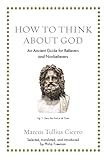How to think about God :
Material type: TextPublication details: Princeton : Princeton University Press, 2019Description: 168 pages ; 18 cmContent type: text Media type: unmediated Carrier type: volumeISBN: 9780691183657 (hbk.) :Contained works: Cicero, Marcus Tullius. Natura deorum. Selections. English | Cicero, Marcus Tullius. Somnium Scipionis. EnglishSubject(s): Scipio Aemilianus, P. Cornelius (Publius Cornelius), Africanus minor, 185 B.C. or 184 B.C.-129 B.C | Scipio, Africanus, approximately 236 B.C.-183 B.C | Gods, Roman -- Early works to 1800 | Stoics -- Early works to 1800 | Theology -- Early works to 1800 | Cosmology, Ancient | Rome -- Religion | ReligionDDC classification: 292.07 LOC classification: PA6307.A2 | F74 2019Summary: Most ancient Romans were deeply religious and their world was overflowing with gods - from Jupiter, Minerva, and Mars to countless local divinities, household gods, and ancestral spirits. One of the most influential Roman perspectives on religion came from a nonreligious belief system that is finding new adherents even today: Stoicism. How did the Stoics think about religion? In this book, Philip Freeman presents vivid new translations of Cicero's 'On the Nature of the Gods' and 'The Dream of Scipio'. In these brief works, Cicero offers a Stoic view of belief, divinity, and human immortality, giving eloquent expression to the religious ideas of one of the most popular schools of Roman and Greek philosophy.
TextPublication details: Princeton : Princeton University Press, 2019Description: 168 pages ; 18 cmContent type: text Media type: unmediated Carrier type: volumeISBN: 9780691183657 (hbk.) :Contained works: Cicero, Marcus Tullius. Natura deorum. Selections. English | Cicero, Marcus Tullius. Somnium Scipionis. EnglishSubject(s): Scipio Aemilianus, P. Cornelius (Publius Cornelius), Africanus minor, 185 B.C. or 184 B.C.-129 B.C | Scipio, Africanus, approximately 236 B.C.-183 B.C | Gods, Roman -- Early works to 1800 | Stoics -- Early works to 1800 | Theology -- Early works to 1800 | Cosmology, Ancient | Rome -- Religion | ReligionDDC classification: 292.07 LOC classification: PA6307.A2 | F74 2019Summary: Most ancient Romans were deeply religious and their world was overflowing with gods - from Jupiter, Minerva, and Mars to countless local divinities, household gods, and ancestral spirits. One of the most influential Roman perspectives on religion came from a nonreligious belief system that is finding new adherents even today: Stoicism. How did the Stoics think about religion? In this book, Philip Freeman presents vivid new translations of Cicero's 'On the Nature of the Gods' and 'The Dream of Scipio'. In these brief works, Cicero offers a Stoic view of belief, divinity, and human immortality, giving eloquent expression to the religious ideas of one of the most popular schools of Roman and Greek philosophy.
| Item type | Current library | Call number | Status | Date due | Barcode | Item holds |
|---|---|---|---|---|---|---|
 Books
Books
|
Main Library Non-Fiction - General Stacks | 292.07 .C568 2019 (Browse shelf (Opens below)) | Available | 32562 |
Includes bibliographical references.
Most ancient Romans were deeply religious and their world was overflowing with gods - from Jupiter, Minerva, and Mars to countless local divinities, household gods, and ancestral spirits. One of the most influential Roman perspectives on religion came from a nonreligious belief system that is finding new adherents even today: Stoicism. How did the Stoics think about religion? In this book, Philip Freeman presents vivid new translations of Cicero's 'On the Nature of the Gods' and 'The Dream of Scipio'. In these brief works, Cicero offers a Stoic view of belief, divinity, and human immortality, giving eloquent expression to the religious ideas of one of the most popular schools of Roman and Greek philosophy.

